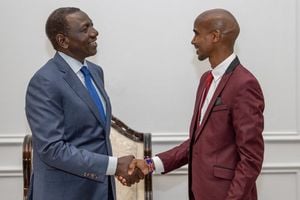Gaddafi: The end of an era

PHOTO | AFP
A rebel soldier fires his rifle in the air as tens of thousands of Libyans celebrate the news of the arrest of Col Gaddafi’s son, Saif al-islam, and the partial fall of Tripoli into rebel hands. Libyan rebels surged into Tripoli on Sunday in a final drive to oust Col Gaddafi. INSET: A portrait of the Libyan leader set on fire by demonstrators during a protest outside the Libyan embassy in Ankara, Turkey.
What you need to know:
- Rebels proclaim victory as resistance by Libyan leader crumbles.
- Captured sons of besieged dictator may be handed over to ICC.
- South Africa denies offering asylum.
- Arab countries recognise Libyan rebels.
TRIPOLI, Monday
Libya’s four-decade leader Muammar Gaddafi, a former revolutionary whose capital has been overrun by rebels, has gone underground after vowing to go down fighting.
With his exact whereabouts unknown, he clung to power in Tripoli for months in defiance of Nato air strikes and a revolt that turned into civil war.
Libyan rebels have acknowledged that victory will not be theirs until the capture of Gaddafi, the self-styled “king of kings” in the African continent and larger-than-life figure with an unorthodox style all of his own.
“We will not, we will not abandon Tripoli to the occupants and their agents. I am with you in this battle,” the Libyan strongman said in an audio tape broadcast on Sunday.
“We do not surrender and, by God’s grace, we will emerge victorious.”
If he survives the revolution, the flamboyant Gaddafi is now more likely to return to the world stage at the International Criminal Court, which has indicted him for alleged war crimes.
His two sons have been captured by the rebels.
Renowned for his extravagant dress sense and rambling rhetoric, the 69-year-old embattled Libyan leader, came up against an unprecedented challenge to his rule after anti-regime protests erupted on February 15.
His appearances have since been reduced to scratchy audio tape appeals.
While witnesses reported bloodshed, massacres and overwhelmed mortuaries after the indiscriminate shooting of civilians, Gaddafi dismissed the youth-led uprising and played up the revolution which brought him to power decades ago.
As a young colonel, Gaddafi on September 1, 1969, led a coup overthrowing the Western-backed elderly King Idriss and quickly established himself as a belligerent and unpredictable leader.
Reputedly born in a Bedouin tent in the desert near Sirte on June 7, 1942, Gaddafi alienated the West soon after seizing power, accusing it of launching a “new crusade” against Arabs.
His idol was Egyptian president Gamal Abdel Nasser, and he also variously declared himself a fan of Stalin and Hitler.
In February 2009, Gaddafi was elected chairman of the African Union, after having grown disillusioned with Arab unity and months after African tribal dignitaries bestowed on him the title of “king of kings.”
Meanwhile a group of Kenyan elders patronised by besieged Libyan leader Muammar Gaddafi has condemned the ongoing advance of opposition forces in Tripoli.
The House of Traditional Elders of Kenya, a group led by Goldenberg scandal architect Kamlesh Pattni, condemned Nato’s help to the rebels.
Secretary-general Phares Ruteere said they were condemning Nato as “democracy requires negotiations”.
“I have been to Libya and think that Mr Gaddafi is a great ruler who has led his country to prosperity.
“The only reason he is a target of the West is because he has been advocating a united Africa with one leader,” Mr Ruteere said.
French attack
In March, the group also condemned the US, UK and French attacks on Libya that led to Mr Gaddafi going into hiding.
The Kenyan group has visited Libya three times and held talks with Mr Gaddafi.
They all presented lists of projects they wanted funded, and in January, they crowned him the “King of Africa”.
The House of Traditional Elders of Kenya was registered on December 22, 2009, with Mr Pattni as chairman and former Luo Council of Elders chairman Riaga Ogallo its deputy. (AFP)




